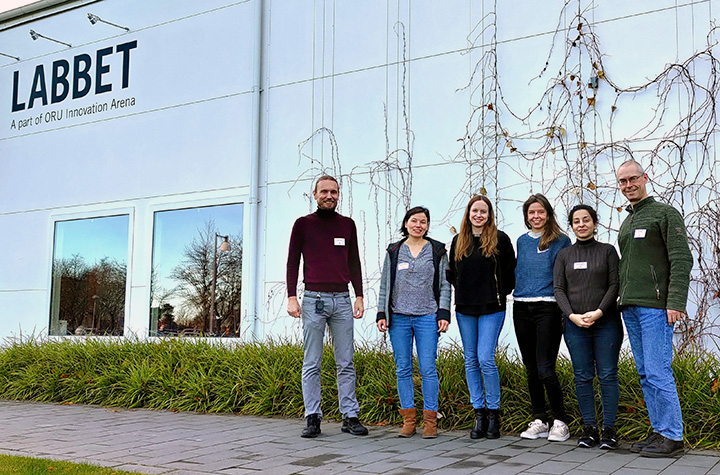Bioinformatics
About this group
Group information
Contact
Research subject
Research environments
- The Life Science Centre
-
Responsive Nutrition Research Centre

Objectives Background
Functional Analyses in Bioinformatics, in contrast to the sister bioinformatics disciplines of Structural Analysis and Sequence Analysis, focuses on molecular profile analysis, pattern detection in mega-variate data, biosignature detection, and network analyses. Molecular profiles can be data on various OMICs levels, i.e. transcriptome, proteome, metabolome, miRNA profiles, genome-wide SNP-data, and next generation sequencing data (targeted 16S rRNA genes, (meta-)genome-wide, RNAseq, CRISPR results), and combinations of these kinds of data with clinical data. These profiles are analysed for their correlation and functional relationships regarding the clinical phenome, consisting of clinical traits and modern high-dimensional measurements. Time-resolved data series of the types outlined above are appropriate for true systems biological reverse engineering, which is, especially for high-throughput data, overlapping with functional bioinformatics. These two fields meet in hybrid modelling, where mechanistic models are amalgamated with statistical predictive models, a currently hot area of translational bioinformatics research. Also computational biology is overlapping, when it focuses on different levels of functional modelling of biological function, ranging from detailed differential equation systems to qualitative modelling using e.g. Bayesian networks, Boolean networks or action languages.
Specific Objectives for Functional Bioinformatics at Örebro University
The group is integrated within several of Örebro University strong research environments:
Man-Technology_environment research centre (MTM)
The Life Science Centre
Functional Bioinformatics focusses on analysing interactions of molecular profiles, clinical data and microbiota distributions in healthy and diseased patients, both with respect to candidate biosignature mining as well as for investigating causal structures taking a systems biological approach. Our aim is to contribute to the identification of the defining patterns in inflammatory responses and/or gut-microbiome space (bridging composition and diverse functional levels), governing adaptability to disease challenges, ability for resilience, and eligibility for a certain treatment - taking a precision medicine perspective. Molecular and immune profiling of different tissues are studied from a systems bioinformatics point of view. Recently, we began to analyse functional brain imaging data, on different functional levels, including differential connectivity analysis, to find interactions with gut status and the status of the gut-brain axis signalling. Within IBD-research, we focus on predictive and prognostic signatures from combined clinical and molecular (proteomics, lipidomics, microbiota, miRNA) profiles. Within the Environmental Forensic Laboratory (ENFORCE, https://www.oru.se/english/research/research-groups/rg/?rdb=g314), and within X-HiDE, a strategical initiative to Explore Inflammation in Health and Disease (https://www.oru.se/english/strategic-initiatives/strategic-research-profiles/x-hide/), as well as part of PAN Sweden (https://formas.se/en/start-page/archive/news/news/2020-11-23-multi-million-investment-in-swedish-centres-for-food-research-and-innovation.html), Functional Bioinformatics has a strategic role in these collaborations, both to implement translational and statistical bioinformatics approaches and to further develop such methods.
Special Competences
Analysis of functional molecular high-throuput datasets (OMICs data): transcriptome, proteome, metabolome, miRNA-profiles, SNP-data, microbiome profiles – univariate by regularized approaches , multivariate by unsupervised and supervised statistical learning, geneset enrichment methods, as well as molecular network analyses (e.g. both with Ingenuity® IPA, based on STRING network structure, as well as based on the Atlas of Inflammation Resolution AIR [https://air.bio.informatik.uni-rostock.de/]).
Analysis of Next Generation Sequencing (NGS) data: Whole genome sequencing (human and metagenomic), targeted sequencing (16S rRNA genes, exome sequencing etc), RNAseq, CRISPR-results. Large projects are run on the UPPMAX national compute cluster.
Application / interpretation / development of multivariate analysis methods from the field of machine learning for biosignature detection and validation
- supervised applications: biomarker and biosignatures, PLS-methods, regularised regression, Random Forests, Canonical Correlation Analysis, etc
- un-supervised applications: clustering, PCA/ICA, factor analysis
- interpretation: detection of structures of the regulatory system (genotype-phenoytype-map) with systems biological focus
- integrative analyses: using different profiling data and/or different clinical trait data at the same time to both get a better classification and improved functional understanding of the discriminative bio-medical processes; modelling of mega-variate interactions for classification and prediction
- recent research focus:
- integrative multi-OMICs predictive and prognostic models (with clinical data, interactions, and random effects, towards precision medicine)
- using a priori knowledge of functional network structures
- hybrid modelling (integrating mechanistic and statistic models) - qualitative and multi-level modelling
- biostatistical/bioinformatics counselling
External cooperation partners
- Biostatistics/Bioinformatics Group, Dept. of Chemistry, Biotechnology and Food Science, IKBM
Norwegian University of Life Sciences
Postboks 5003
N – 1432 Ås, Norway - Chair for Systemsbiology and Bioinformatics
Fakultät für Informatik und Elektrotechnik,
Universität Rostock
Albert Einstein Str. 21
D – 18051 Rostock, Germany - Institute for Biostatistics and Informatics in Medicine and Ageing Research -- IBIMA
University of Rostock, Medical Faculty
Ernst-Heydemann-Str. 8
D – 18057 Rostock, Germany - McMaster University, Department of Medicine
1280 Main Street West
Hamilton, Ontario L8S 4K1, Canada - Bioinformatics
Institute for Animal Health
Pirbright Laboratory
Ash Road, Pirbright,
GB – Surrey GU24 0NF, United Kingdom - Proteomics Proteomics Core Facility
Göteborgs universitet,
Box 413
405 30 Göteborg - Integrative Systems Biology group [https://liu.se/en/research/systems-biology]
Linköping University
SE-581 83 Linköping
Collaborations include:
Shoaib Bakhtyar (Research Data Manager MV/HV), Rita Gebert (Master student), Sukithar Rajan (PhD student, completed 2020).
Research projects
Active projects
- Biosignatures and functional network structures
- Metabolomics signatures in medical and environmental pattern studies
- Network medicine and systems biological approaches to modeling inflammation
- Proteome signatures in IBD
- Systematic modelling: quantitative and semi-qualitative implementations of nutrition-microbe-gut-blood-brain interactions regarding the role of butyrate
- X-HiDE


